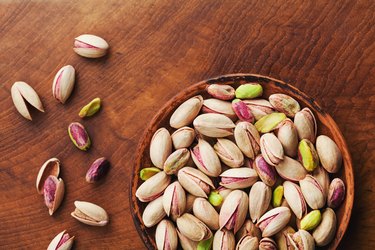
If you're looking for a healthy snack, nuts like pistachios are a great option. This green nut is available salted, shelled and roasted, and can easily be incorporated into salads or baked goods. Although snacks for adults can range between 200 and 300 calories, snacks for children are recommended to be no more than 100 calories.
Read More: 16 Snacks That Are OK to Eat at Night
Video of the Day
Video of the Day
Calories in Pistachios
According to the United States Department of Agriculture and the Pistachio Health Organization, a standard 1-ounce serving of pistachios is equivalent to 49 kernels and 158 calories. This means a reduced serving of 100 calories is equivalent to about 30 pistachio kernels. An equivalent 100-calorie snack might be 10 almonds, cashews or walnuts, or 16 peanuts.
Whether you're choosing the reduced serving or the standard serving, the calories in pistachios make them a healthy choice and provide you with a lot more nuts per calorie than some others. In comparison, a standard serving of cashews is equivalent to only 18 nuts, and a standard serving of walnuts equals only 14 nut halves. The caloric intake between types of nuts can be similar, though. For example, in a standard serving, the calories in peanuts equal 160. This is about the same as the standard serving of pistachios.
Pistachio Nutrition Facts
Pistachios are rich in beneficial nutrients. They contain fiber, protein and healthy fats that are good for your heart. The fiber and protein in pistachios makes them a healthy snacking option that may be more filling compared to carbohydrate-rich snacks like chips, crackers and pretzels.
According to the USDA, pistachios are rich in calcium, iron, vitamin A and vitamin C. They are also a good source of copper, manganese, phosphorus, thiamin and vitamin B-6. Like many nuts and seeds, pistachios are sold after roasting and salting, making the sodium content of some brands high. Pistachios alone typically have no sodium content — literally, zero milligrams of sodium. However, an ounce of pistachios that have been salted can contain as much as 115 milligrams of sodium.
Read More: 19 High-Fiber Foods — Some May Surprise You!
Why Eat Pistachios?
If the beneficial vitamins and minerals in pistachios aren't enough to entice you, pistachios have also been linked to a wide range of health benefits.
- A 2014 study in the Journal of Diabetes Care showed that pistachios can be used to improve glucose metabolism and insulin resistance, reversing the negative metabolic aspects that come with prediabetes.
- A 2014 study in the British Journal of Nutrition showed that pistachios are also good for your digestive system. They influence gut microbes and do so more strongly than other nuts, like almonds.
- According to a 2015 study in the Journal of Nutrition, eating pistachios can lower blood sugar and cholesterol and improve vascular stiffness.
- A 2015 review in the British Journal of Nutrition showed that pistachios, which are rich in antioxidants and have beneficial anti-inflammatory potential, can help regulate blood sugar, manage weight and improve heart health.
Read More: 9 Healthy Nuts That May Help You Live Longer
- Pistachio Health Institute: Pistachios: SMALL NUT – MIGHTY NUTRITION
- Diabetes Care: Beneficial Effect of Pistachio Consumption on Glucose Metabolism, Insulin Resistance, Inflammation, and Related Metabolic Risk Markers: a Randomized Clinical Trial
- British Journal of Nutrition: Effects of almond and pistachio consumption on gut microbiota composition in a randomised cross-over human feeding study
- British Journal of Nutrition: Nutrition attributes and health effects of pistachio nuts
- Nutrition: Effect of pistachio nut consumption on endothelial function and arterial stiffness
- BBC Health: Limit children's snacks to 100 calories, health body says
- Pistachio Health Institute: PISTACHIOS AND WEIGHT MANAGEMENT
- Pistachio Health Institute: PISTACHIOS AND HEART HEALTH
- Pistachio Health Institute: NUTRITIONAL BENEFITS IN A NUTSHELL
- Clemson.edu: SNACKS WITH 100 CALORIES OR LESS
- USDA: SHELLED PISTACHIOS, UPC: 727915211023
- Pistachio Health Institute: PISTACHIOS: A HANDFUL OF HEALTHY SNACKING
- USDA: DRY ROASTED UNSALTED PEANUTS, UPC: 075450124590